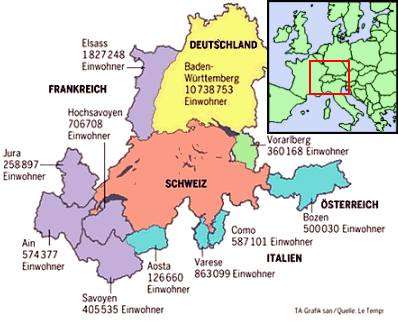
After World War Two, territorial changes in Western Europe were supposed to be a thing of past. The fall of the Soviet Empire required big adjustments to the map of Eastern and Central Europe, but once all those changes were complete, European cartographers — with the notable exception of those charting Kosovo — were idled.
The EU was supposed to be the ultimate force for territorial stability among the states of Europe. As it worked towards “an ever-closer union”, it made Europe’s internal borders irrelevant — of what concern were national frontiers when all were to be absorbed into the new European megastate?
Switzerland, however, is not a member of the EU. In 1992 Swiss voters narrowly voted against signing on to what was then the Treaty of Maastricht. Switzerland, unlike most European countries, takes the results of its referenda seriously, and thus has remained outside the EU.
And now comes a proposal to readjust the borders of Switzerland. The article below reads like a hoax: The Swiss People’s Party has proposed that Switzerland annex ethnically compatible adjacent regions of France, Germany, Austria, and Italy, and thereby increase its population by 243%.
Read it all the way to the punch line at the end, however, and you’ll see that it’s entirely serious:
Greater Switzerland Just Might Take Off
The Swiss far-right wants to expand the country by annexing German, French, Austrian and Italian border regions, reports Gazeta Wyborcza. The Swiss People’s Party (SVP) floated the idea in June but only now has submitted a draft proposal calling for necessary changes to the constitution to make the enlargement possible. The regions in question are the German state of Baden Württemberg, French departments Alsace, Savoy, Jura and Ain, Italian provinces Aosta, Como, Varese and Bozen and the Austrian province of Vorarlberg.
If the SVP plan were implemented, Switzerland’s population would increase by 17 million (it currently stands at 7 million) with Stuttgart becoming its largest city. “We should facilitate integration of these regions which are suffering under the rule of the European political class that has no interest in them whatsoever. Their citizens have been looking jealously at our self-governing state and long for a democracy with human face”, explain SVP politicians.
The Swiss authorities have not commented on the proposal which nevertheless caused much glee in the German embassy in Bern. Its employees are said to have been wondering when the Swiss will “start demanding access to the sea”. Their good humours disappeared at seeing the results of a poll conducted by the Swiss weekly Weltwoche. It showed that 63% of nearly 1,800 German, Italian and Austrian polled living in the border regions said they were in favour of joining Switzerland. Hardly surprising considering the fact that salaries in Switzerland are much higher than in, for example, Germany and that Germans already constitute a majority of lecturers at many Swiss universities.
Now we come to the sticky part: a substantial majority of the population in these border regions actually favors being annexed by Switzerland.
And, when you think about it, who wouldn’t? Despite the relatively high cost of living in Switzerland, the sclerotic economy and high unemployment in the European Union make the Confederation Helvetica look awfully good by comparison. The idea of an orderly and prosperous alternative to the EU must be irresistible.
However, we should all bear in mind the potential dangers of pushing for territorial exchanges on the basis of public opinion polls. The fact that 37% of the population does not want to become part of Switzerland should not be minimized. A change of sovereignty that leaves more than six million people in various degrees of unhappiness carries a potential for the sort of trouble with which we became all too familiar during the first half of the last century.
Between 1935 and 1940 large chunks of European territory changed hands, in most cases accompanied by plebiscites which confirmed the overwhelming popularity of the results. Yet somehow all that popular approval failed to prevent the most cataclysmic war in history.
It’s a sobering thought, one that enthusiasts for a Greater Switzerland should ponder well before pursuing any plans for territorial expansion.
COMMENTS
Please let us know if you're having issues with commenting.